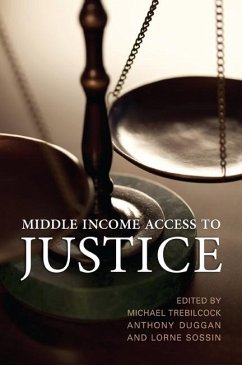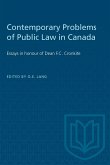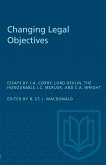- Broschiertes Buch
- Merkliste
- Auf die Merkliste
- Bewerten Bewerten
- Teilen
- Produkt teilen
- Produkterinnerung
- Produkterinnerung
Middle Income Access to Justice presents a variety of innovative solutions, from dispute resolution process reforms to the development of non-lawyer forms of assistance and new methods for funding legal expenses
Andere Kunden interessierten sich auch für
![A Matter of Interpretation A Matter of Interpretation]() Antonin ScaliaA Matter of Interpretation25,99 €
Antonin ScaliaA Matter of Interpretation25,99 €![Law's Infamy Law's Infamy]() Austin SaratLaw's Infamy34,99 €
Austin SaratLaw's Infamy34,99 €![The Common Flaw The Common Flaw]() Thomas G. MoukawsherThe Common Flaw25,99 €
Thomas G. MoukawsherThe Common Flaw25,99 €![Courts in Federal Countries Courts in Federal Countries]() Courts in Federal Countries58,99 €
Courts in Federal Countries58,99 €![Jurisprudence Jurisprudence]() Mark MacGuiganJurisprudence63,99 €
Mark MacGuiganJurisprudence63,99 €![Contemporary Problems of Public Law in Canada Contemporary Problems of Public Law in Canada]() Otto LangContemporary Problems of Public Law in Canada31,99 €
Otto LangContemporary Problems of Public Law in Canada31,99 €![Changing Legal Objectives Changing Legal Objectives]() Ronald MacdonaldChanging Legal Objectives24,99 €
Ronald MacdonaldChanging Legal Objectives24,99 €-
-
-
Middle Income Access to Justice presents a variety of innovative solutions, from dispute resolution process reforms to the development of non-lawyer forms of assistance and new methods for funding legal expenses
Produktdetails
- Produktdetails
- Verlag: University of Toronto Press
- Seitenzahl: 624
- Erscheinungstermin: 3. Mai 2012
- Englisch
- Abmessung: 244mm x 151mm x 32mm
- Gewicht: 766g
- ISBN-13: 9781442612686
- ISBN-10: 1442612681
- Artikelnr.: 36129672
- Herstellerkennzeichnung
- Libri GmbH
- Europaallee 1
- 36244 Bad Hersfeld
- gpsr@libri.de
- Verlag: University of Toronto Press
- Seitenzahl: 624
- Erscheinungstermin: 3. Mai 2012
- Englisch
- Abmessung: 244mm x 151mm x 32mm
- Gewicht: 766g
- ISBN-13: 9781442612686
- ISBN-10: 1442612681
- Artikelnr.: 36129672
- Herstellerkennzeichnung
- Libri GmbH
- Europaallee 1
- 36244 Bad Hersfeld
- gpsr@libri.de
Michael J. Trebilcock is a university professor emeritus of law and economics at the University of Toronto.
Foreword
The Right Honourable Beverley McLachlin, P.C., Chief Justice of Canada
List of Contributors
Part 1: Introduction
Michael Trebilcock (University of Toronto), Anthony Duggan (University of
Toronto), and Lorne Sossin (Dean of Osgoode Hall Law School)
Part 2: Defining the Problem – What are the Unmet Legal Needs?
Chapter 1: Caught in the Middle: Income, Justiciable Problems and the Use
of Lawyers
Pascoe Pleasance (University College London) and Nigel J. Balmer
(University College London)
Chapter 2: The Ontario Civil Needs Project: A Comparative Analysis of the
2009 Survey Data
Jamie Baxter, Michael Trebilcock, and Albert Yoon (University of Toronto)
Part 3: “Front-End” Proactive Solutions
Chapter 3:Front-End Strategies for Improving Consumer Access to Justice
Anthony Duggan (University of Toronto) and Iain Ramsey (University of Kent)
Part 4: Non-Lawyer Forms of Assistance
Chapter 4: Opportunities and Challenges: Non-Lawyer Forms of Assistance in
Providing Access to Justice for Middle-Income Earners
Russell Engler (New England Law)
Chapter 5: Middle Income Access to Civil Justice: Implications of Proposals
for the Reform of Legal Aid in England and Wales
Roger Smith
Part 5: Access to Lawyers
Chapter 6: Should Legal Services be Unbundled?
Samreen Beg and Lorne Sossin
Chapter 7: Money Isn’t Everything: Understanding Moderate Income
Households’ Use of Lawyers’ Services
Rebecca Sandefur (American Bar Foundation)
Chapter 8: Legal Services Plans: Crucial Time Access to Lawyers and the
Case for a Public-Private Partnership
Paul Vayda (CAW Legal Services Plan) and Stephen Ginsberg (CAW Legal
Services Plan)
Part 6: Reforming the Dispute Resolution Process
Chapter 9: Reforming Family Dispute Resolution in Ontario: Systemic Changes
and Cultural Shifts
Nicholas Bala (Queen's University)
Chapter 10: Commentary on Bala
Justice George Czurtin (Justice of the Superior Court of Justice - Ontario)
Chapter 11: Access to Justice for Small Amount Claims in the Consumer
Marketplace: Lessons from Australia
Justin Malbon (Monash University)
Chapter 12: Challenges in Small Claims Court System Design: Does One Size
Fit All?
Shelley McGill (Deputy Judge of the Ontario Small Claims Court)
Part 7: Creating Change and Reform of the Justice System
Chapter 13: Growing Ontario Legal Aid into the Middle Class: A Proposal for
Public Legal Expenses Insurance
Sujit Choudry (University of Toronto), Michael Trebilcock, and James Wilson
Part 8: The Options Papers
Noel Semple (York University) and Carol Rogerson (University of Toronto),
Middle Income Access to Justice: Policy Options with respect to Family Law
Judith McCormack (University of Toronto) and Azim Remani (University of
Toronto), Middle Income Access to Justice: Policy Options with Respect to
Employment Law
Anthony Duggan, Azim Remani and Dennis Kao (Sidley Austin LLP), Middle
Income Access to Justice: Policy Options with respect to Consumer and
Debtor-Creditor Law
Part 9: Select Bibliography
The Right Honourable Beverley McLachlin, P.C., Chief Justice of Canada
List of Contributors
Part 1: Introduction
Michael Trebilcock (University of Toronto), Anthony Duggan (University of
Toronto), and Lorne Sossin (Dean of Osgoode Hall Law School)
Part 2: Defining the Problem – What are the Unmet Legal Needs?
Chapter 1: Caught in the Middle: Income, Justiciable Problems and the Use
of Lawyers
Pascoe Pleasance (University College London) and Nigel J. Balmer
(University College London)
Chapter 2: The Ontario Civil Needs Project: A Comparative Analysis of the
2009 Survey Data
Jamie Baxter, Michael Trebilcock, and Albert Yoon (University of Toronto)
Part 3: “Front-End” Proactive Solutions
Chapter 3:Front-End Strategies for Improving Consumer Access to Justice
Anthony Duggan (University of Toronto) and Iain Ramsey (University of Kent)
Part 4: Non-Lawyer Forms of Assistance
Chapter 4: Opportunities and Challenges: Non-Lawyer Forms of Assistance in
Providing Access to Justice for Middle-Income Earners
Russell Engler (New England Law)
Chapter 5: Middle Income Access to Civil Justice: Implications of Proposals
for the Reform of Legal Aid in England and Wales
Roger Smith
Part 5: Access to Lawyers
Chapter 6: Should Legal Services be Unbundled?
Samreen Beg and Lorne Sossin
Chapter 7: Money Isn’t Everything: Understanding Moderate Income
Households’ Use of Lawyers’ Services
Rebecca Sandefur (American Bar Foundation)
Chapter 8: Legal Services Plans: Crucial Time Access to Lawyers and the
Case for a Public-Private Partnership
Paul Vayda (CAW Legal Services Plan) and Stephen Ginsberg (CAW Legal
Services Plan)
Part 6: Reforming the Dispute Resolution Process
Chapter 9: Reforming Family Dispute Resolution in Ontario: Systemic Changes
and Cultural Shifts
Nicholas Bala (Queen's University)
Chapter 10: Commentary on Bala
Justice George Czurtin (Justice of the Superior Court of Justice - Ontario)
Chapter 11: Access to Justice for Small Amount Claims in the Consumer
Marketplace: Lessons from Australia
Justin Malbon (Monash University)
Chapter 12: Challenges in Small Claims Court System Design: Does One Size
Fit All?
Shelley McGill (Deputy Judge of the Ontario Small Claims Court)
Part 7: Creating Change and Reform of the Justice System
Chapter 13: Growing Ontario Legal Aid into the Middle Class: A Proposal for
Public Legal Expenses Insurance
Sujit Choudry (University of Toronto), Michael Trebilcock, and James Wilson
Part 8: The Options Papers
Noel Semple (York University) and Carol Rogerson (University of Toronto),
Middle Income Access to Justice: Policy Options with respect to Family Law
Judith McCormack (University of Toronto) and Azim Remani (University of
Toronto), Middle Income Access to Justice: Policy Options with Respect to
Employment Law
Anthony Duggan, Azim Remani and Dennis Kao (Sidley Austin LLP), Middle
Income Access to Justice: Policy Options with respect to Consumer and
Debtor-Creditor Law
Part 9: Select Bibliography
Foreword
The Right Honourable Beverley McLachlin, P.C., Chief Justice of Canada
List of Contributors
Part 1: Introduction
Michael Trebilcock (University of Toronto), Anthony Duggan (University of
Toronto), and Lorne Sossin (Dean of Osgoode Hall Law School)
Part 2: Defining the Problem – What are the Unmet Legal Needs?
Chapter 1: Caught in the Middle: Income, Justiciable Problems and the Use
of Lawyers
Pascoe Pleasance (University College London) and Nigel J. Balmer
(University College London)
Chapter 2: The Ontario Civil Needs Project: A Comparative Analysis of the
2009 Survey Data
Jamie Baxter, Michael Trebilcock, and Albert Yoon (University of Toronto)
Part 3: “Front-End” Proactive Solutions
Chapter 3:Front-End Strategies for Improving Consumer Access to Justice
Anthony Duggan (University of Toronto) and Iain Ramsey (University of Kent)
Part 4: Non-Lawyer Forms of Assistance
Chapter 4: Opportunities and Challenges: Non-Lawyer Forms of Assistance in
Providing Access to Justice for Middle-Income Earners
Russell Engler (New England Law)
Chapter 5: Middle Income Access to Civil Justice: Implications of Proposals
for the Reform of Legal Aid in England and Wales
Roger Smith
Part 5: Access to Lawyers
Chapter 6: Should Legal Services be Unbundled?
Samreen Beg and Lorne Sossin
Chapter 7: Money Isn’t Everything: Understanding Moderate Income
Households’ Use of Lawyers’ Services
Rebecca Sandefur (American Bar Foundation)
Chapter 8: Legal Services Plans: Crucial Time Access to Lawyers and the
Case for a Public-Private Partnership
Paul Vayda (CAW Legal Services Plan) and Stephen Ginsberg (CAW Legal
Services Plan)
Part 6: Reforming the Dispute Resolution Process
Chapter 9: Reforming Family Dispute Resolution in Ontario: Systemic Changes
and Cultural Shifts
Nicholas Bala (Queen's University)
Chapter 10: Commentary on Bala
Justice George Czurtin (Justice of the Superior Court of Justice - Ontario)
Chapter 11: Access to Justice for Small Amount Claims in the Consumer
Marketplace: Lessons from Australia
Justin Malbon (Monash University)
Chapter 12: Challenges in Small Claims Court System Design: Does One Size
Fit All?
Shelley McGill (Deputy Judge of the Ontario Small Claims Court)
Part 7: Creating Change and Reform of the Justice System
Chapter 13: Growing Ontario Legal Aid into the Middle Class: A Proposal for
Public Legal Expenses Insurance
Sujit Choudry (University of Toronto), Michael Trebilcock, and James Wilson
Part 8: The Options Papers
Noel Semple (York University) and Carol Rogerson (University of Toronto),
Middle Income Access to Justice: Policy Options with respect to Family Law
Judith McCormack (University of Toronto) and Azim Remani (University of
Toronto), Middle Income Access to Justice: Policy Options with Respect to
Employment Law
Anthony Duggan, Azim Remani and Dennis Kao (Sidley Austin LLP), Middle
Income Access to Justice: Policy Options with respect to Consumer and
Debtor-Creditor Law
Part 9: Select Bibliography
The Right Honourable Beverley McLachlin, P.C., Chief Justice of Canada
List of Contributors
Part 1: Introduction
Michael Trebilcock (University of Toronto), Anthony Duggan (University of
Toronto), and Lorne Sossin (Dean of Osgoode Hall Law School)
Part 2: Defining the Problem – What are the Unmet Legal Needs?
Chapter 1: Caught in the Middle: Income, Justiciable Problems and the Use
of Lawyers
Pascoe Pleasance (University College London) and Nigel J. Balmer
(University College London)
Chapter 2: The Ontario Civil Needs Project: A Comparative Analysis of the
2009 Survey Data
Jamie Baxter, Michael Trebilcock, and Albert Yoon (University of Toronto)
Part 3: “Front-End” Proactive Solutions
Chapter 3:Front-End Strategies for Improving Consumer Access to Justice
Anthony Duggan (University of Toronto) and Iain Ramsey (University of Kent)
Part 4: Non-Lawyer Forms of Assistance
Chapter 4: Opportunities and Challenges: Non-Lawyer Forms of Assistance in
Providing Access to Justice for Middle-Income Earners
Russell Engler (New England Law)
Chapter 5: Middle Income Access to Civil Justice: Implications of Proposals
for the Reform of Legal Aid in England and Wales
Roger Smith
Part 5: Access to Lawyers
Chapter 6: Should Legal Services be Unbundled?
Samreen Beg and Lorne Sossin
Chapter 7: Money Isn’t Everything: Understanding Moderate Income
Households’ Use of Lawyers’ Services
Rebecca Sandefur (American Bar Foundation)
Chapter 8: Legal Services Plans: Crucial Time Access to Lawyers and the
Case for a Public-Private Partnership
Paul Vayda (CAW Legal Services Plan) and Stephen Ginsberg (CAW Legal
Services Plan)
Part 6: Reforming the Dispute Resolution Process
Chapter 9: Reforming Family Dispute Resolution in Ontario: Systemic Changes
and Cultural Shifts
Nicholas Bala (Queen's University)
Chapter 10: Commentary on Bala
Justice George Czurtin (Justice of the Superior Court of Justice - Ontario)
Chapter 11: Access to Justice for Small Amount Claims in the Consumer
Marketplace: Lessons from Australia
Justin Malbon (Monash University)
Chapter 12: Challenges in Small Claims Court System Design: Does One Size
Fit All?
Shelley McGill (Deputy Judge of the Ontario Small Claims Court)
Part 7: Creating Change and Reform of the Justice System
Chapter 13: Growing Ontario Legal Aid into the Middle Class: A Proposal for
Public Legal Expenses Insurance
Sujit Choudry (University of Toronto), Michael Trebilcock, and James Wilson
Part 8: The Options Papers
Noel Semple (York University) and Carol Rogerson (University of Toronto),
Middle Income Access to Justice: Policy Options with respect to Family Law
Judith McCormack (University of Toronto) and Azim Remani (University of
Toronto), Middle Income Access to Justice: Policy Options with Respect to
Employment Law
Anthony Duggan, Azim Remani and Dennis Kao (Sidley Austin LLP), Middle
Income Access to Justice: Policy Options with respect to Consumer and
Debtor-Creditor Law
Part 9: Select Bibliography








